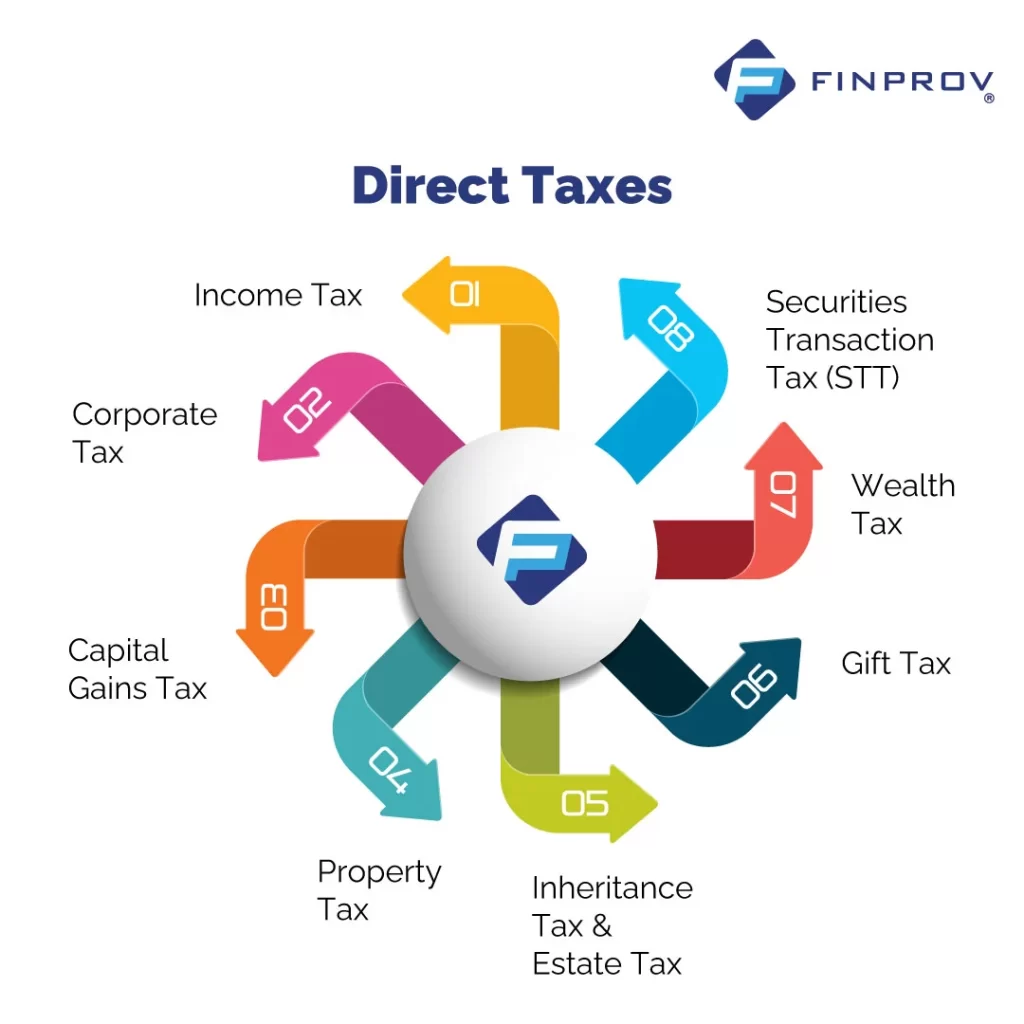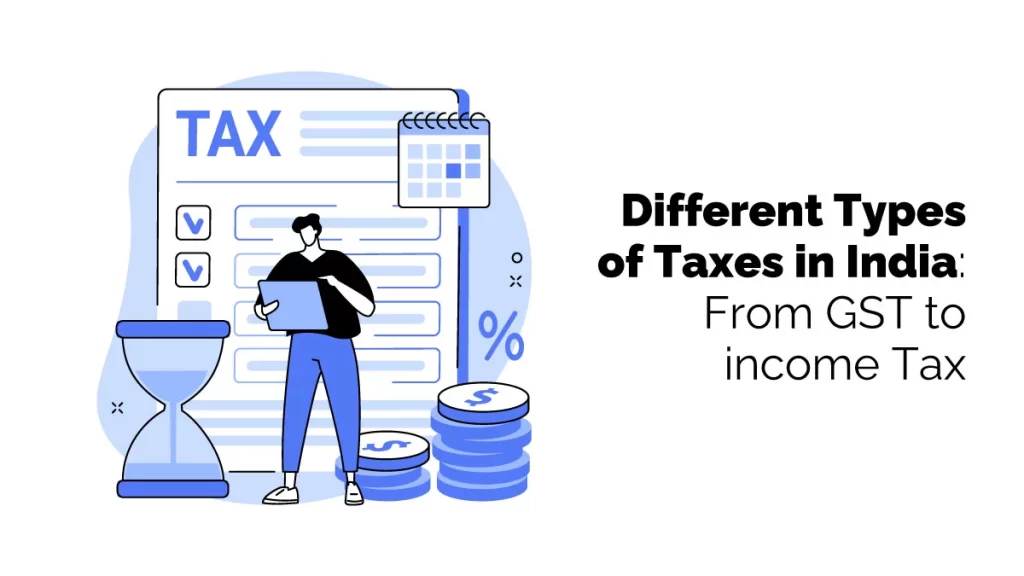Taxes are mandatory contributions made by individuals or corporations falling under specific tax slabs to the Government of India. From local to national levels, taxes are applicable across various sectors in India and serve as a significant source of income for the Government. The Government imposes taxes to make revenue for various projects, boost the country’s economy, and improve its citizens’ living standards. The authority to levy taxes in India is derived from the Constitution of India, which grants the power to impose tariffs to both State and Central governments.
All taxes levied within the country must be supported by accompanying laws passed by either the State Legislature or the Parliament. These laws provide the legal framework for imposing and collecting taxes, ensuring transparency and fairness in the tax system.
Types of Taxes in India
In a broader context, taxes can be categorized into two main types: direct and indirect taxes, each with different implementation methods. Direct taxes, such as income tax, corporate tax, and wealth tax, are paid directly by individuals or entities to the Government. On the other hand, indirect taxes, including sales tax, service tax, and value-added tax, are paid indirectly as part of the cost of goods or services.
Aside from these two conventional tax categories, the Government may introduce other taxes with specific agendas. These “Other Taxes” are applicable both direct and indirect. Examples of such taxes include the recently introduced Swachh Bharat Cess Tax, Infrastructure Cess Tax, and Krishi Kalyan Cess Tax, among others. These special taxes are imposed to fund and support particular initiatives and projects by the country’s Central Government, addressing specific national priorities and goals.
Direct Taxes

Direct taxes are a combination of several tax types that individuals pay directly to the Government and cannot be transferred to another person. The oversight and administration of these taxes are the responsibility of the Central Board of Direct Taxes (CBDT) under the Department of Revenue. The following are the main types of Direct Taxes:
- Income Tax: This tax is imposed on an individual’s income, including salaries, business profits, capital gains, and other sources of earnings. The tax rates are generally progressive, meaning higher payments are taxed faster.
- Corporate Tax: Corporations and companies are subject to corporate tax levied on their profits. Like income tax, corporate tax rates may also vary based on the company’s profit levels.
- Capital Gains Tax: This tax applies to the profit earned from selling assets, such as property, stocks, bonds, or other investments. The tax rate can vary based on the holding period and the type of asset.
- Property Tax: Property tax is levied on the value of real estate owned by individuals or entities. Local governments typically collect property taxes to fund various public services and infrastructure development.
- Inheritance Tax and Estate Tax: These taxes are imposed on transferring wealth from one individual to another through inheritance or gifts. The tax rates may vary based on the relationship between the giver and the receiver and the estate’s value.
- Gift Tax: Gift tax is applied to transferring certain assets or money from one person to another without consideration or in exchange for inadequate care.
- Wealth Tax: Although not prevalent in all countries, some jurisdictions impose a wealth tax on individuals with significant net worth or assets exceeding a specified threshold.
- Securities Transaction Tax (STT): STT is levied on transactions involving securities such as stocks and mutual funds. It aims to capture some profits from trading in these financial instruments.
Indirect Taxes

Indirect taxes are not imposed directly on individuals but on goods and services. These taxes are paid to the Government by intermediaries involved in the supply chain, and the tax amount is then added to the final value of goods and services. Below are some of the different types of indirect taxes:
- Goods and Services Tax (GST): GST stands for Goods and Services Tax, a thorough indirect tax applied on the provision of goods and services across India. It replaced multiple cascading taxes like excise duty, service tax, and value-added tax (VAT). GST is categorized into Central GST (CGST) and State GST (SGST), depending on whether the transaction is intra-state or inter-state. Integrated GST (IGST) applies to inter-state transactions.
- Value Added Tax (VAT): Although GST has subsumed VAT in most parts of India, some states continue to levy VAT on certain items. VAT is imposed at various supply chain stages, and the tax amount is added to the product’s value.
- Customs Duty: Customs duty is imposed on goods imported or exported from a country. The Government determines these taxes to regulate imports and protect domestic industries.
- Excise Duty: Previously applicable on manufacturing goods, excise duty has been replaced by GST. However, it may still apply to certain goods like petroleum and alcohol.
- Service Tax: Service tax applied to specific services provided by service providers. With the introduction of GST, service tax has been subsumed under it.
- Central Sales Tax (CST): CST was levied on the sale of goods between different states in India. However, with the implementation of GST, CST has been abolished.
- Entertainment Tax: Entertainment tax was imposed on selling tickets for various forms of entertainment, such as movies, amusement parks, and cultural events. States had the authority to levy this tax, but it has been subsumed under GST.
Differences Between Direct and Indirect Taxes in India
Now that we have a clear understanding of the meaning and types of direct and indirect taxes in India, let’s examine the critical differences between these two tax categories:
| Context | Direct Tax | Indirect Tax |
| Meaning | Paid directly to the government | Paid to the government via intermediary |
| Levied on | Profits and income | Goods and services |
| Taxpayer | Individuals, HUFs, and businesses | End-consumers of products, goods, and services |
| Tax Rate | Directly depends on income and profits | Same for everyone |
| Tax Burden | Progressive | Rate of tax is flat, so tax burden is regressive |
| Transfer of liability | Not transferable | Can be transferable |
| Tax Collection | Complex | Quite convenient |
| Types | Income Tax and STT | Goods and Services Tax (GST) |
| Evasion | Possible | Not possible |
The Implication of Taxation in India
In India, taxation serves as a means to provide revenue for the government, supporting vital activities and programs such as infrastructure development, social welfare initiatives, and national defence. Additionally, taxation is essential in wealth redistribution and promoting social and economic progress. The government can use taxation to stimulate economic growth, address income inequality, and encourage certain financial behaviours. For example, businesses can be offered tax incentives to invest in research and development, while individuals can be encouraged to save for retirement through tax benefits. By utilising taxation effectively, the Indian government can guide the economy towards sustainable development and provide its citizens with a just and equitable society.
A proportional mix of direct and indirect taxes is essential for economic growth. Direct taxes ensure fair contributions based on income and profits, reducing income inequality. Indirect taxes encourage responsible consumption and fund public services and infrastructure, promoting sustainable development. An effective tax policy can stimulate investments, create jobs, and support societal needs, fostering a prosperous economy.
To learn more about Taxes, joining an Income Tax and GST certification course will help everyone acquire more industry knowledge. Finprov’s GST Online Course equips participants with real-time examples, covering various GST topics such as Input Tax Credits, E-way Bill, and Reverse Charge Mechanisms. It is open to graduates, CAs, company secretaries, and finance professionals. The Income Tax Online Accounting Course by Finprov focuses on income tax concepts, including significant heads of income, TDS & TCS basics, and accounting practices. Practical training at the end of each topic ensures learners grasp the concepts effectively. Both courses are offered online, allowing learners to access and enhance their GST and Income Tax skills and knowledge.










